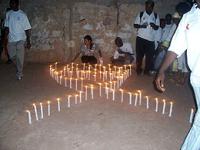
Rocking in Nepal: A band on stage at the World AIDS Day concert in Damak.
Credit: UNHCR
As the world marked World AIDS Day on Tuesday, UNHCR’s chief, António Guterres, revealed that the UN Refugee Agency had expanded its global HIV interventions.
Guterres, while reiterating his personal commitment to keeping AIDS a priority for UNHCR, also stressed that his agency would continue to advocate for the abolishment of laws discriminating against those with HIV.
In an annual message to staff, the High Commissioner noted: "We now have activities in more than 75 countries, and 75 percent of refugees have access to anti-retroviral therapy when it is available to surrounding host country nationals, whereas 63 percent have access to prevention of mother-to-child transmission programmes (PMTCT)."
We have 100 percent coverage for voluntary counselling and testing, PMTCT and anti-retroviral therapy for refugees.".
UN High Commissioner for Refugees, António Guterres (UNHCR)
He continued that in southern Africa, the epicentre of the AIDS epidemic, "We have 100 percent coverage for voluntary counselling and testing, PMTCT and anti-retroviral therapy for refugees." In 2005, UNHCR only had HIV programmes in Africa and Asia; it has since expanded these to the Americas and Eastern Europe.
Guterres said UNHCR's goal was to ensure that all people of concern to the agency had access to these essential services. "Furthermore, the HIV and AIDS response for internally displaced persons and for high risk groups among UNHCR's persons of concern needs strengthening," he said.
The High Commissioner also pledged to help staff members affected by HIV. "More needs to be done to combat stigma and to support those staff members who live with HIV. We are committed to reaching the 10 UN minimum standards on HIV in the workplace by 2011, so that every staff member has an active knowledge about HIV and AIDS prevention, treatment and related rights within the UN system," he said.

Refugees in Gambia commemorate World AIDS Day.
Credit: UNHCR
"World AIDS Day provides each of us with an opportunity to renew our resolve to fight the epidemic both in our personal and professional lives and I encourage us all to do exactly that," Guterres concluded.
UNHCR held a wide range of activities at Geneva headquarters and in field offices and camps for the forcibly displaced around the world. A banner of a large red ribbon, symbolizing AIDS awareness, was hanging from the façade of the headquarters building, where staff could pick up literature and educational material on HIV as well as purchase silk and cotton clothing items made by people living with HIV in Thailand.
Among overseas events held to mark World AIDS Day, was an awareness-raising concert for refugees and local communities in eastern Nepal. The event, held at a school in Damak with support from FC Barcelona, featured a wide range of music, including Nepali folk, raga, rock, funk, blues and jazz.





